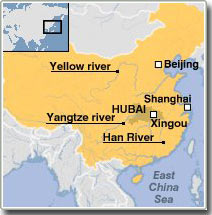Pollution changes the color of rivers in China
The water source of more than 200,000 people in central China has been dirty due to pollution, causing the main river branches to turn red. At least three tributaries of the Han River, a tributary of the Yangtze River, have been affected. National media reported high chemical content in river water.
China is very concerned about environmental issues. The recent ban on plastic bags has caused China's largest plastic bag factory to close. According to Xinhua news agency, Xinglong, Tianguan and Dongjing rivers are all affected by pollution. It is suspected that a chemical spill has caused this phenomenon, but the source of contamination has not been identified and China is conducting an investigation.
 Gao Qijin, an employee of a water company in Xinguo, told Xinhua that the Dongjing river water turned red with lots of air bubbles. He said the company doubted water pollution and immediately stopped taking water from the river. As a result, about 60,000 people in Xinguo are running out of tap water. According to reports, they must use bottled water and limited groundwater.
Gao Qijin, an employee of a water company in Xinguo, told Xinhua that the Dongjing river water turned red with lots of air bubbles. He said the company doubted water pollution and immediately stopped taking water from the river. As a result, about 60,000 people in Xinguo are running out of tap water. According to reports, they must use bottled water and limited groundwater.
Xinhua reports that five schools have been closed and others cannot provide food for students.
Zheng Jiarong, the deputy mayor of Qianjiang city, said water companies in five towns are required to stop taking water from these rivers. Local officials closed the gate connecting the Han River with the river branches and had to use water from a nearby lake to repel pollution.
China has been faced with reckless or reckless difficulties in using chemicals for industry and agriculture. Last week a farmer in southwestern Yunnan province was arrested for destroying a nearby fish farm after he spread phosphorus in the field because it could make fertilizer.
China's largest plastic bag manufacturer has to declare its closure and lay off more than 20,000 employees. Huaqiang factory in Henan province previously produced about 250,000 tons of plastic bags, worth 2.2 billion yuan (about 305 million dollars) each year.
A company executive told Xinhua that the company had no other choice because 90% of its products were on the government's ban list in an effort to reduce waste and pollution.


People have to rely on limited alternative water sources (Photo: BBC)
China is facing water pollution (Photo: BBC)
- The water has strange colors in China
- The campaign hunts for black, stinking rivers in China
- 28,000 rivers in China disappear
- Scientist 'went out' to clean up rivers and lakes
- Pollution of water makes people lose their livelihood
- China spent 277 billion USD to solve the problem of pollution
- China wants to keep the right to publish pollution indicators
- Sunset color lavender in Nanjing
- Polluted lands in China
- Serious air pollution alarm in China
- China falls into serious pollution
- 1,000 dead ducks floating rivers in China
 Is the magnetic North Pole shift dangerous to humanity?
Is the magnetic North Pole shift dangerous to humanity? Washington legalizes the recycling of human bodies into fertilizer
Washington legalizes the recycling of human bodies into fertilizer Lightning stone - the mysterious guest
Lightning stone - the mysterious guest Stunned by the mysterious sunset, strange appearance
Stunned by the mysterious sunset, strange appearance